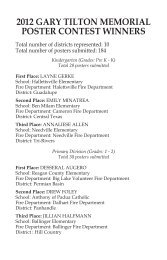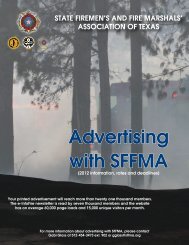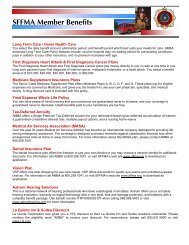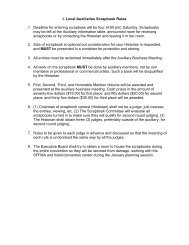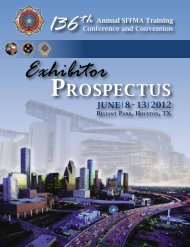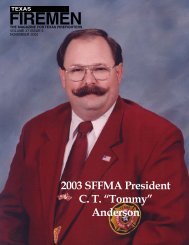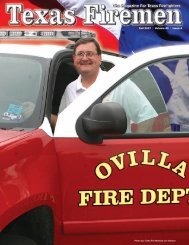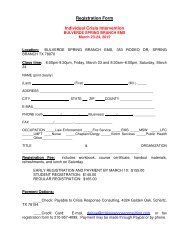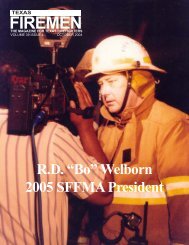Certification Frequently Asked Questions - Click Here
Certification Frequently Asked Questions - Click Here
Certification Frequently Asked Questions - Click Here
You also want an ePaper? Increase the reach of your titles
YUMPU automatically turns print PDFs into web optimized ePapers that Google loves.
State Firemen’s and Fire Marshals’ Association of TexasTexas Volunteer Firefighters’ and Fire Marshals’ <strong>Certification</strong> Board4450 Frontier Trail • Austin, Texas 78745-1514 • (512) 454-3473certification@sffma.org • www.sffma.org • (800) 580-7336THE VOLUNTEER CERTIFICATION PROGRAMThe following information has been designed to inform all members of the Association aboutvarious aspects involved in the SFFMA <strong>Certification</strong> Program. While the Austin office staff shouldalways be considered a resource for any questions regarding certification and membershipadvantages, your primary source of information is your Zone Representative to the <strong>Certification</strong>Board. Your Board is composed of a remarkable group of individuals who donate their time andoften their personal finances to promote and uphold the SFFMA program. To tap into thisinvaluable resource and determine your area board member please call the Association office at(800) 580-7336 or review the current roster on the <strong>Certification</strong> page of the Association website(www.sffma.org).THE BASICS OF CERTIFICATIONFIRST THINGS FIRSTThe heart of the Volunteer <strong>Certification</strong> Program is the <strong>Certification</strong> Coordinator. Selection of aCoordinator is the first step toward starting a certification program for your department. Thisperson is responsible and liable along with the Fire Chief to validate that all training andcertifications meet state criteria and have, in fact, been met. This individual must be at leastcertified as a Basic firefighter and have completed an instructional course such as InstructionalTechniques or Methods of Teaching. Other comparable courses are: Texas Department of HealthEMT Instructor, Texas Teaching <strong>Certification</strong>, Master’s or Bachelor’s Degree, any Armed ServicesInstructor <strong>Certification</strong> or an Instructor <strong>Certification</strong> from the Texas Commission on FireProtection. The Coordinator does not actually have to conduct the training, but it is his/herresponsibility to document the training and ensure that a qualified instructor has conducted thetraining.In the event that a department selects someone as <strong>Certification</strong> Coordinator who does NOT meetthe minimum qualifications, a provisional certificate may be granted with a three-year limit forcompleting training requirements. In addition, each <strong>Certification</strong> Coordinator must attend acertification workshop at least once every two years. Coordinators granted a provisional statusMUST attend the workshop EVERY year. Workshops are available at the State Convention, oftenat District meetings, or may be arranged through your Zone Representative to the <strong>Certification</strong>Board.Please note that the Fire Chief and Coordinator of record must sign ALL applications submittedto the Austin office. If you are unsure as to whom the Coordinator of record is for yourdepartment, please contact the Austin office. In the event the Coordinator is not up-to-date, anapplication should be submitted for processing.The Austin staff must also be notified when there is a change of Fire Chief. A letter should besubmitted to the Austin office as soon as possible after a personnel change in this position.Revised January 2011 62
LEVELS OF FIRE FIGHTING CERTIFICATIONThere are various levels of firefighter certification an individual might strive to obtain. TheSFFMA program allows individual departments and their members to decide how far they will goin the process. These levels include the Introductory, Basic, Intermediate, Advanced and Mastercertifications. Introductory Fire Fighting certification is a <strong>Certification</strong> Board recommendationequivalent to 73 hours of training prior to participation in an actual live structural fire. Basic,Intermediate and Advanced levels are equivalent to 170, 356 and 543 hours respectively. As theprogram was designed to utilize stages of training, please note that an individual must obtainhis/her Basic certificate before applying for the Intermediate level. The same principal applies tothe Advanced level (i.e. an individual must have Basic and Intermediate certification in order tomove up to the Advanced level). At all levels specific objectives must be met in order to receivecredit for category. For a detailed list of the objectives, please consult your certification packet.INSTRUCTIONThere are four (4) levels of instructor: Departmental Instructor and Instructor I, II and III. TheDepartmental Instructor must be a current dues-paying member of the Association and have atleast two (2) years of Fire Service experience, but is not required to be firefighter certified or tomeet the instructional coursework criteria. It should be noted that the Departmental Instructoris approved to teach only at the Basic level and ONLY within the department named on thecertificate.Applicants for Instructor I must be a current dues-paying member of the Association and haveat least three (3) years of Fire Service experience, to be at least Basic Firefighter certified throughSFFMA, and have met the NFPA 1041: Instructor I requirement. A Methods of Teaching Course forthe Fire Service, or TCFP Instructor certification will also satisfy the instructional requirement,however Instructional Techniques for Company Officers will NOT. Instructor I certified individualsmay conduct training on all levels and in all categories within any SFFMA member department.Applicants for Instructor II must be a current dues-paying member of the Association and haveat least three (3) years of Fire Service experience, to be at least Basic Firefighter certified throughSFFMA, and have met the NFPA 1041: Instructor II requirement. TCFP Instructor II certificationwill also satisfy the instructional requirement. Instructor II certified individuals may conducttraining on all levels and in all categories within any SFFMA member department.Applicants for Instructor III must be a current dues-paying member of the Association and haveat least three (3) years of Fire Service experience, to be at least Basic Firefighter certified throughSFFMA, and have met the NFPA 1041: Instructor III requirement. TCFP Instructor III certificationwill also satisfy the instructional requirement. Instructor III certified individuals may conducttraining on all levels and in all categories within any SFFMA member department.Revised January 2011 63
PROGRESS REPORTSDepartmental Progress Reports are due by January 31st annually; otherwise a single $25 latefee will be assessed on the report. The report must be in alphabetical order, and includemembers of the department who were Association members participating in the certificationprogram during the reporting year.“Objectives Covered During Reporting Year Only” – Mark through all objectives the individualcovered from January 1 through December 31 of the reporting year.“All Objectives Covered Including Reporting Year” – Mark through all objectives the individualcovered.All training for each individual is to be reported, including those levels at which an individualmay have already been certified.In order to distinguish between the thousands of individuals in the program, the full legal name,SFFMA ID#, last four digits of the Social Security number, and date of birth must be submittedfor each entry.The <strong>Certification</strong> Coordinator and Fire Chief of record MUST sign the report cover page; faxed,photocopied, pencil or stamped signatures ARE NOT accepted. In the event the report isincomplete or contains errors, a letter of explanation will be sent so that corrections may bemade.Revised January 2011 64



